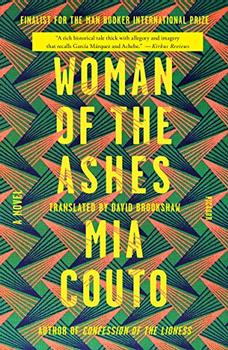Summary | Excerpt | Reviews | Beyond the Book | Readalikes | Genres & Themes | Author Bio

A Sands of the Emperor Novel
by David Brookshaw, Mia Couto1
UNEARTHED STARS
Mother says: Life is made like string. We need to braid it until we can no longer distinguish its threads from our fingers.
Each morning, seven suns would rise over the plains of Inharrime. In those times, the firmament was much larger, and all the stars were contained within it, the living and the dead. Naked just as she had slept, our mother would leave the house, a sieve in her hand. She was going to choose the best of the suns. With her sieve, she would gather up the remaining six stars and bring them back to the village. She would bury them next to the anthill behind our house. That was our graveyard for heavenly creatures. One day, if we ever needed to, we would go and unearth stars. With such a bequest, we were not poor. That's what our mother, Chikazi Makwakwa, said. Or just mame, in our native language.
Whoever visited us would be aware of the other reason for this belief. It was in the anthill that we buried the placentas of newborn babies. A mafura tree had taken root on top of it. We would tie white cloths around its trunk. It was there that we talked to our dead.
But the anthill was the opposite of a cemetery. It was a guardian of the rains, and within it dwelt our eternity.
One day, when the morning had been well sieved, a boot trampled on the sun, the sun that Mother had chosen. It was a military boot, like those worn by the Portuguese. This time, however, it was worn by an Nguni soldier. The soldier had been sent by the emperor Ngungunyane.
Emperors hunger for land, and their soldiers are mouths that devour nations. That boot shattered the sun into a thousand pieces. And the day turned to darkness. All the other days as well. The seven suns were dying under the soldiers' boots. Our land was being gobbled up. Devoid of stars to nourish our dreams, we learned to be poor. And we lost our eternity too. Knowing that eternity is merely another name for life.
* * *
My name is Imani. The name I was given isn't a name. In my mother tongue, Imani means "Who's there?" You knock on a door, and from inside someone asks:
Imani?
So my identity was merely a question. As if I were a shadow without a body, the endless wait for an answer.
In our village of Nkokolani, it is said that a newborn's name comes from a whisper heard before birth. In a mother's womb, it is not just another body being woven together. A soul, the moya, is being produced. While still in the darkness of the womb, this moya is gradually made from the voices of those who have already died. One of these ancestors asks the new being to adopt his or her name. In my case, the wind whispered Layeluane, the name of my paternal grandmother.
As tradition required, our father went to consult a medicine man. He wanted to know whether we had captured that spirit's genuine wish. And the unexpected happened: the soothsayer refused to confirm the legitimacy of my baptism. It was necessary to consult a second medicine man, who, generously and in return for a payment of one pound sterling, assured him that everything was in order. However, because I cried ceaselessly during the first months of my life, the family came to the conclusion that I had been given the wrong name. Auntie Rosi, the family's own soothsayer, was consulted. After she had cast her magic bones, our aunt declared, In this girl's case, it's not her name that's wrong, it's her life that needs to be put right.
My father withdrew from his duties: my mother needed to deal with me. And that is what she did, naming me "Ash." No one knew the reason for such a name, which in fact didn't last long. After the death of my sisters, swept away in the floods, I was given the name "Live Girl." That's how they referred to me, as if the fact that I had survived were the only feature that distinguished me. My parents would tell my brothers to go and see where the "Live Girl" was. It wasn't a name. It was a way of not admitting their other daughters were dead.
Excerpted from Woman of the Ashes by Mia Couto. Copyright © 2018 by Mia Couto. Excerpted by permission of Farrar, Straus & Giroux. All rights reserved. No part of this excerpt may be reproduced or reprinted without permission in writing from the publisher.
Your guide toexceptional books
BookBrowse seeks out and recommends the best in contemporary fiction and nonfiction—books that not only engage and entertain but also deepen our understanding of ourselves and the world around us.